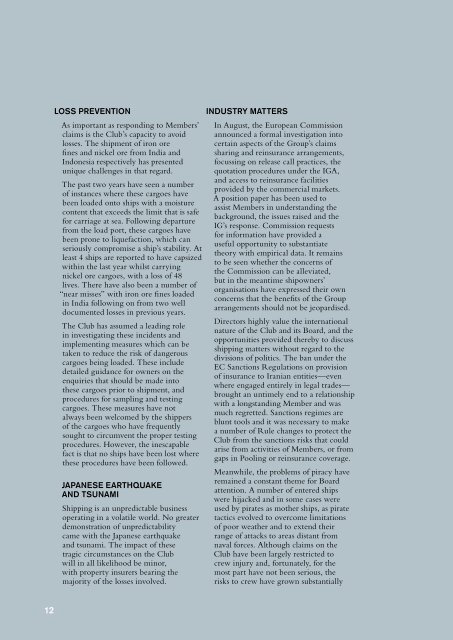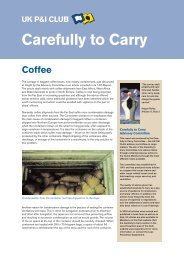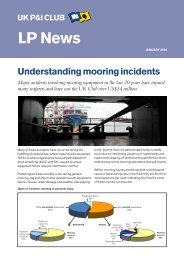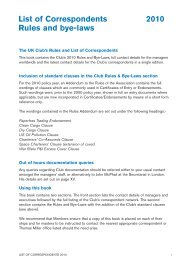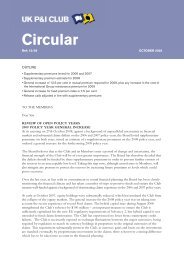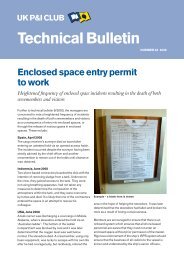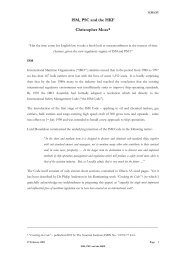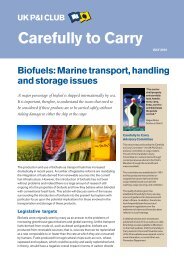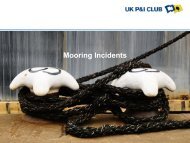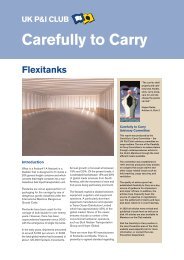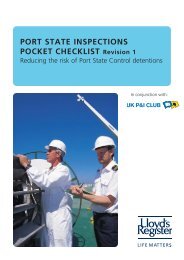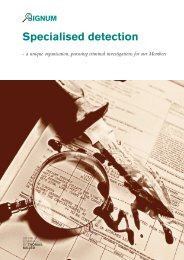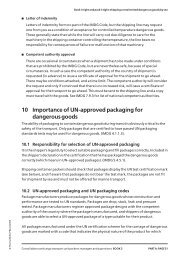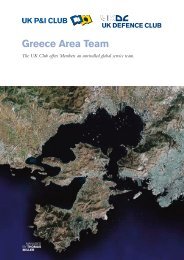2011 ROTY - UK P&I
2011 ROTY - UK P&I
2011 ROTY - UK P&I
Create successful ePaper yourself
Turn your PDF publications into a flip-book with our unique Google optimized e-Paper software.
LOSS PREVENTION<br />
As important as responding to Members’<br />
claims is the Club’s capacity to avoid<br />
losses. The shipment of iron ore<br />
fines and nickel ore from India and<br />
Indonesia respectively has presented<br />
unique challenges in that regard.<br />
The past two years have seen a number<br />
of instances where these cargoes have<br />
been loaded onto ships with a moisture<br />
content that exceeds the limit that is safe<br />
for carriage at sea. Following departure<br />
from the load port, these cargoes have<br />
been prone to liquefaction, which can<br />
seriously compromise a ship’s stability. At<br />
least 4 ships are reported to have capsized<br />
within the last year whilst carrying<br />
nickel ore cargoes, with a loss of 48<br />
lives. There have also been a number of<br />
“near misses” with iron ore fines loaded<br />
in India following on from two well<br />
documented losses in previous years.<br />
The Club has assumed a leading role<br />
in investigating these incidents and<br />
implementing measures which can be<br />
taken to reduce the risk of dangerous<br />
cargoes being loaded. These include<br />
detailed guidance for owners on the<br />
enquiries that should be made into<br />
these cargoes prior to shipment, and<br />
procedures for sampling and testing<br />
cargoes. These measures have not<br />
always been welcomed by the shippers<br />
of the cargoes who have frequently<br />
sought to circumvent the proper testing<br />
procedures. However, the inescapable<br />
fact is that no ships have been lost where<br />
these procedures have been followed.<br />
JAPANESE EARTHQUAKE<br />
AND TSUNAMI<br />
Shipping is an unpredictable business<br />
operating in a volatile world. No greater<br />
demonstration of unpredictability<br />
came with the Japanese earthquake<br />
and tsunami. The impact of these<br />
tragic circumstances on the Club<br />
will in all likelihood be minor,<br />
with property insurers bearing the<br />
majority of the losses involved.<br />
INDUSTRY MATTERS<br />
In August, the European Commission<br />
announced a formal investigation into<br />
certain aspects of the Group’s claims<br />
sharing and reinsurance arrangements,<br />
focussing on release call practices, the<br />
quotation procedures under the IGA,<br />
and access to reinsurance facilities<br />
provided by the commercial markets.<br />
A position paper has been used to<br />
assist Members in understanding the<br />
background, the issues raised and the<br />
IG’s response. Commission requests<br />
for information have provided a<br />
useful opportunity to substantiate<br />
theory with empirical data. It remains<br />
to be seen whether the concerns of<br />
the Commission can be alleviated,<br />
but in the meantime shipowners’<br />
organisations have expressed their own<br />
concerns that the benefits of the Group<br />
arrangements should not be jeopardised.<br />
Directors highly value the international<br />
nature of the Club and its Board, and the<br />
opportunities provided thereby to discuss<br />
shipping matters without regard to the<br />
divisions of politics. The ban under the<br />
EC Sanctions Regulations on provision<br />
of insurance to Iranian entities—even<br />
where engaged entirely in legal trades—<br />
brought an untimely end to a relationship<br />
with a longstanding Member and was<br />
much regretted. Sanctions regimes are<br />
blunt tools and it was necessary to make<br />
a number of Rule changes to protect the<br />
Club from the sanctions risks that could<br />
arise from activities of Members, or from<br />
gaps in Pooling or reinsurance coverage.<br />
Meanwhile, the problems of piracy have<br />
remained a constant theme for Board<br />
attention. A number of entered ships<br />
were hijacked and in some cases were<br />
used by pirates as mother ships, as pirate<br />
tactics evolved to overcome limitations<br />
of poor weather and to extend their<br />
range of attacks to areas distant from<br />
naval forces. Although claims on the<br />
Club have been largely restricted to<br />
crew injury and, fortunately, for the<br />
most part have not been serious, the<br />
risks to crew have grown substantially<br />
12


